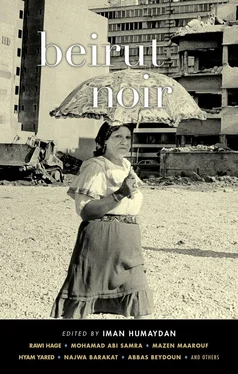Suddenly I remember the first man in Los Angeles whose bed I spent the night in. I forgot his name many years ago, but the years haven’t erased the memory of the morning in his kitchen where we drank instant coffee with milk. The silence was warm and thick in the big kitchen, resembling the sensation of sleep. My body relaxed in a dark calm. I was stretched out naked on the sofa, wrapped in a white sheet pulled back to partly expose my breasts and thighs, with luxurious and artificial negligence, like women in advertisements. My legs were resting on the chair close to the table on which the man whose name I’ve forgotten was sitting, naked except for his baggy, multicolored underpants.
I don’t know if my feelings of disconnect from the world truly date back to our morning session in the kitchen, or if they were from the long gap in time separating me from that moment we lived together. But here I am now on a rocking chair soaring above the scarce city lights on my sixtieth birthday. From the outside, our silent scene recurs in my mind; I hear the echoes of the man’s voice asking me if the day before had left strange feelings in me that perhaps the passing of days made even stronger and more present in my body.
That was the first time in my life a man had asked me such a question. It revealed his sensual desire for me, converting it into an old, fleeting memory. His question allowed me a sensual answer about a blurry, abstract thought which used to recur in my inner consciousness and which I couldn’t put words to: chance encounters lead us, we meet and we part with trivial memories, so that life is and remains trivial, just like a passing memory of chance encounters.
The man smoked greedily and ecstatically in those moments. It was as if the tobacco which filled his lungs and was exhaled through his mouth granted his feelings and words a redoubled strength, making our dark morning meetings in the kitchen a lust-filled ritual emanating from our strange bodies that had lain together the night before. I kept silently soaring in the eyes of this stranger. One time he got up from the table and approached me. I hadn’t anticipated that he would pour the milky coffee ever so slowly over my naked shoulders and lick it from my breasts with his orange tongue.
Sitting and snuggling, we came together on the sofa when I asked him in a faint lust-filled voice about his female colleague, the journalist who’d interviewed me while he was photographing me the previous evening at the Armenian Club, where my first exhibition of paintings in Los Angeles was opening. He whispered in my ear that they were siblings of Armenian descent and my whole body started trembling, reaching an orgasm for the first time in more than a year, since I had emigrated from Beirut. My spasms began transmitting like a storm in all my senses, every part of my body, followed by waning flashes of lightning that illuminated the darkened screen of my vision.
I postponed my shower for the second time. I turned on the computer and wrote: How long has it been since I’ve heard a voice, my own or someone else’s, in this house of mine? It’s as if I haven’t talked to anyone or heard anyone talking to me except outside for a long time.
An apparition of the Virgin emerged in my imagination; it stopped me from writing and made me laugh. The crown of thorns of Golgotha on the Messiah’s head, then on my mother’s head, and a bloody tear streaming down her pale, deathly white cheek. My father slowly ripping the Virgin’s dress off her chest, while she smiled at him, thrusting her tongue out and moving it between her lips, exactly the way I’d sketched her in my room a few days before my trip to Rome on a scholarship to study drawing. While I was outlining her angelic face, I kept hearing echoes of my mother’s words — that she would lose me, that I would lose myself, that I would disappear, all alone in Rome, and never be heard from again. That I would never come back. Her words made me laugh. An impudent smile hung on the face of the Virgin and I drew her tongue licking her lips.
The evening of my trip, I hung my picture of the Virgin on the living room wall. My mother was extremely anxious, but her sadness and trepidation were concealed behind a mask of happiness put on to greet well-wishers who flocked to our house. We sat together in the living room, with our entire family. I purposely sat under the picture of the Virgin that I’d drawn, and during certain moments that evening I tried out the expressions of the Virgin on my own face. That evening I met our Armenian neighbors and others, our relatives who I hardly knew, some of whom I’d never even met before. I stood at my mother’s side to receive and greet them, but from time to time that evening I had to rush to my room, so that I could unleash the laughter that took me by surprise and get control over it in order to answer the old ladies’ questions about what I would be doing in Italy: how would I live there all alone? They would look at my mother while directing these kinds of questions at me. But it was my grandmother who occasionally took charge of answering. One of the times when I left the living room I heard her say, “She will draw, she will study drawing, she will become a great artist,” and when I turned around I saw her pointing at the picture of the Virgin hanging on the wall.
At that point, my father rushed over to me when he noticed I was bursting into a fit of uncontrollable laughter. He took my hand and led me to my room, where I thought he would lock the door and start scolding me. But he surprised me by letting out a chortle that I’d never heard before. In turn I unleashed my own resounding laugh. He hugged me and held me to his chest, whispering in my ear in his pitiful French that I could laugh as I wished in the streets of Rome and to never let a man own me or rob me of my desire to laugh.
After many years, on one dark, dreary Beirut evening near the beginning of the wars in Lebanon, I managed to elicit one of those rare giggles from my father that I so often wondered when, where, and with whom he allowed to escape. Why did he never do this with us at home? I will never forget that moment when he was sitting alone on the balcony on one of those miserable Beirut evenings. Each one of us was alone in our own room, after we learned that the fire raging for days in the port had burned down his nearby factory and its imported goods. He’d put a glass of whiskey on the table in front of him on the balcony and started drinking, drinking and smoking without stopping, staring at the stray clouds of smoke rising up from the warehouses of the distant port.
I was worried, after he’d been sitting like that for nearly two hours during which I’d left my room a few times to check on him, and he didn’t even notice me standing barefoot in the wide-open inner door leading from the balcony to the living room. Finally, I moved quickly from the door and leaned against him on the wrought-iron railing of the balcony. After a moment of shared silence, I told him that I would never let anyone or anything own me or rob me of my laughter — not in Italy and not in Beirut. I saw him peer at me through faint darkness, before letting out that rare laugh whose darkly murderous bitterness I didn’t recognize until days later, when a heart attack overtook him on the morning of a sunny winter day on that very same balcony.
So here I am lying down in bed, in my bedroom in Los Angeles. Memories of myself in the room of a Kurdish poet I’d met in Beirut thirty years ago blur together. I can imagine him now in a room in Sweden. In another room, perhaps in a sanatorium for mentally ill people, in some country I don’t know, I imagine the Iraqi painter who left the scar on my forehead. Through my Kurdish poet’s thoughts about me, I saw my youthful face and his older gaze during our many rendezvous in Beirut. How different my face is now from how it was when I was young. If my life had led me down another path, to another destiny, would it have been possible for me to be different from how I am now?
Читать дальше












